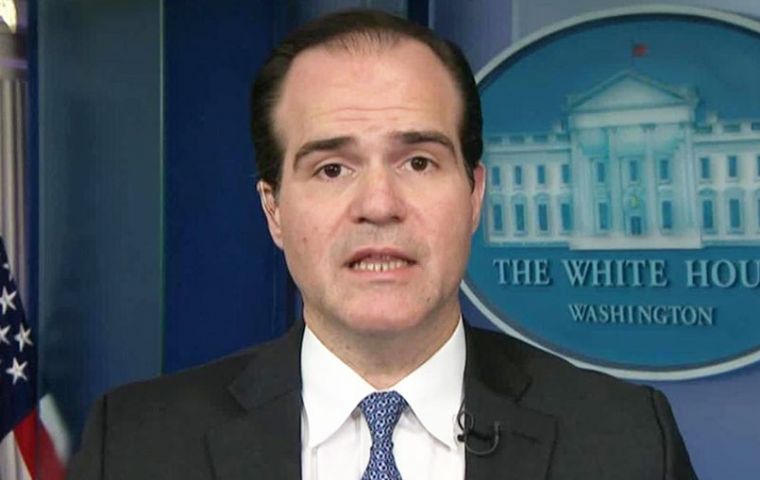MercoPress. South Atlantic News Agency
Latin America must reject Trump’s attempt to leave his mark on the IDB
 There is little in Claver-Carone’s previous experience to show that he understands or cares about these issues or the region’s social or economic challenges
There is little in Claver-Carone’s previous experience to show that he understands or cares about these issues or the region’s social or economic challenges By Christopher Sabatini (*) The Trump administration’s intemperate, partisan crusade against international institutions has extended to the Western Hemisphere’s most important multilateral bank.
Breaking with 60 years of tradition, the White House has nominated a Cuban-American with neither the knowledge of the region nor the training in economics to become the new president of the Inter-American Development Bank (IDB).
The White House’s nomination of Mauricio Claver-Carone seems certainly informed by domestic politics — part of its strategy to win Florida’s 29 electoral votes in November.
Currently the senior director for Western Hemisphere affairs at the National Security Council, Claver-Carone’s previous experience was running a one-man lobbying shop for the U.S.-Cuba embargo. The under qualified candidate owes his meteoric rise from relative obscurity to his benefactor, Sen. Marco Rubio (R-Fla.) — though the senator’s patronage twice failed to get him appointed as assistant secretary of state for the Western Hemisphere, raising the question of why he should be in charge of a regional development institution at a time of unprecedented economic and social distress in Latin America.
It has been an unspoken rule during the IDB’s 60 years that though the U.S. government received a voting share in the IDB’s decision commensurate with its 30% contribution, the presidency of the bank should be held by a Latin American. Latin American presidents at the helm of the bank that lent US$ 13,5bn to the region in 2018 have proposed initiatives on climate change and environmental sustainability, and a series of efforts to address the endemic social and economic exclusion of Indigenous and Afro-descendant populations.
These challenges go to the heart of Latin American and Caribbean citizens’ concerns but are hardly issues that the Trump administration has championed, domestically or internationally.
There is little in Claver-Carone’s previous experience to demonstrate that he understands or cares about these issues or the region’s social or economic challenges. While he briefly held the position as the U.S. executive to the International Monetary Fund (without the Senate confirmation his predecessors enjoyed), his tenure at the NSC has been marked by an all-consuming focus to apply pressure on the so-called troika of tyranny (Cuba, Venezuela and Nicaragua), a political crusade with no real link to the development mandate of the IDB.
As coronavirus cases and deaths continue to rise, Latin America is confronting one its worst economic declines in modern history. Economic growth is expected to decline by 9,3% this year alone, according to the IMF. Latin America and the Caribbean have some of the highest infection rates in the world, and the economic contraction will bring greater inequality in a region historically hobbled by extremes between rich and poor. In July, the United Nations predicted that as a result of the economic fallout from the pandemic and quarantine measures, 45 million people in Latin America and the Caribbean will fall into poverty, with 28 million of those in extreme poverty.
Addressing Latin America and the Caribbean’s economic contraction and its aftermath will require shoring up government public finances stretched thin by stimulus packages and reengineering leaky social safety nets. This will require creative leadership by international financial institutions such as the World Bank, the IMF and the IDB, and more capital from member governments and financial markets.
Meeting these urgent institutional and financial needs will require statesmanship, not the sort of U.S. partisan considerations embodied by the current candidate. And while Claver-Carone has promised he can deliver more funding, with key Democrats in the Senate and House appropriations committees already declaring their opposition to his candidacy, it’s unclear how he could deliver on those promises, let alone lead the institution should President Trump lose in November.
Brazil, Colombia, Ecuador, Panama, Paraguay and Uruguay have expressed their support for the U.S. candidate, but other major stakeholders are calling for the election, scheduled for September, be postponed. The European Union’s top diplomat, Josep Borrell Fontelles recommended postponing the vote to after March 2011; Argentina, Chile and Mexico support the idea.
The vote must be delayed until after th e US election. IDB member countries should all align behind this goal and block the Trump administration from trying to force the vote in September just because it wants to leave its partisan stamp on the bank.
(*) Christopher Sabatini is the Senior Research Fellow for Latin America at the Royal Institute of International Affairs (Chatham House) in London.




Top Comments
Disclaimer & comment rulesCommenting for this story is now closed.
If you have a Facebook account, become a fan and comment on our Facebook Page!